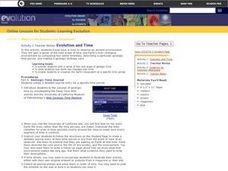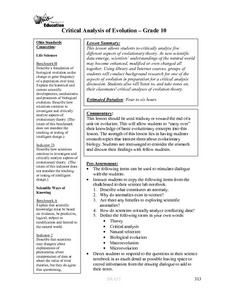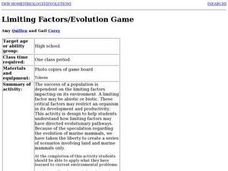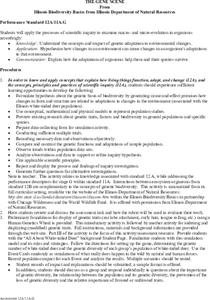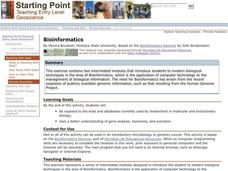Curated OER
Classification and Binomial Nomenclature
Students practice identifying different groups of living organisms using a dichotomous key. Students also examine the history of an organism and its lineage by writing a paragraph about it and "three generations" of ancestors.
Curated OER
A Tree Full of Ancestors
Students study human evolution and the scientific process. They complete the Origins of Humankind Web activity to become familiar with the hominid species as well as the associated evidence found, in the form of fossils and artifacts.
Curated OER
Evolution
Students illustrate the results of natural selection by identifying the specific adaptation of an organism that allows the species to survive in that environment. They illustrate the results of natural selection by recognizing examples...
Curated OER
Who Was Charles Darwin?
Learners research the life of Charles Darwin and his voyage on the Beagle.
Curated OER
Happy Birthday, Earth!
Students visualize the Earth's ecosystem at a specific time period and how Earth has changed over time. They create a detailed journal entry for a specific time period and create a birthday card to Earth.
Curated OER
A Mendel Seminar
Students analyze Gregor Mendel's discovery of a process of biological evolution. They also explore how recessive and dominant traits are passed from one generation of living organisms to the next. This lesson involves environment...
Curated OER
What Is the Nature of Science?
Young scholars distinguish between scientific and everyday meanings of key words-theory, hypothesis, law, fact-and use in context. They recognize the variables that affect observation, data collection, and interpretation. They discover...
Curated OER
A Scientific Approach to Teaching about Evolution
Middle schoolers examine fossils and analyzing their significance in relation to theories of evolution. Hand-outs are provided. This instructional activity could be supplementary to a broader unit on evolution or geology.
Curated OER
Critical Analysis of Evolution
Tenth graders discuss anomalies in nature and science. They discuss times that anomalies led to the collection of data that explained the phenomena and contributed to changing scientific understandings. Students work in groups to...
Curated OER
Understanding the Geologic Timescale
Students identify and analyze how the geologic time scale was developed by investigating 11 periods of time and the vast expanse of time of the Earth's existence. They study their period, determine the important factors indicative to...
Curated OER
Limiting Factors/ Evolution Game
Pupils will understand the relationship between limiting factors and evolution. They will be able to hypothesize possible evolutionary pathways for modern day organisms.
Curated OER
Lamarck Is Dead!
Students read Lamarck's obituary and respond to questions. They discuss the four laws from Lamarack's studies. Students apply this information to scientific theories in general.
Curated OER
Why Don't Whales Have Legs?
Students are given a variety of materials and are asked to design a heat loss experiment that results in a reasonable explanation of "Why don't whales have legs?" students work with the theory of natural selection.
Curated OER
Blocks And Screws (or "screwy Contrivances")
Students, given a block of wood and a screw or nail, are asked to put that screw or nail into a block. They examine how many contrivances and other imperfections found in living things are best explained by the process of evolution.
Curated OER
Word Adaptation
Seventh graders differentiate evolution and adaptation. In this biology lesson, 7th graders make new words from a given word by adding or changing a letter. They set up a T-chart and enumerate how adaptation is like or unlike evolution.
Curated OER
The Gene Scene
Young scholars investigate the concepts of micro and macro evolution. They also research the effects of mutations in the process of genetic adaptation to different environments. They develop a hypothesis of how the environment can...
Curated OER
Bioinformatics
Students are exposed to the tools and databases currently used by researchers in molecular and evolutionary biology. They gain a better understanding of gene analysis, taxonomy, and evolution.
Curated OER
Hertzsprung-Russell Diagram
Students examine the relationship between temperature and brightness. In this astronomy lesson students will correlate the evolution of stars to the HR diagram plotted.
Curated OER
Natural Selection and the Peppered Moth
Young scholars study natural selection and its process in the peppered moth. In this evolution lesson, students read about the concept of natural selection as suggested by Charles Darwin. Young scholars then complete a natural selection...
NASA
Cosmic Microwave Background
Begin your next class with a BANG! Pupils discuss the formation of our universe and its expansion before proceeding with an activity designed to demonstrate what most likely occurred billions of years ago. They conclude with a discussion...
ARKive
Adaptations for Movement
What animals are best suited for moving around a rainforest, or a desert? Design your own animal species based on a particular habitat, focusing on the characteristics it will need for optimal movement. Great as a group lesson or...
Curated OER
Hide and Survive: A Natural Selection Activity
Students explore the theory of natural selection given certain scenarios. In this biology lesson, students graph data taken from the experiment. They explain the factors that contribute to the survival of the fittest.
Curated OER
The Right Tool for the Job: Fishing Tools and Technology
Students use modern technology to research the history, design, and function of a specific tool or piece of fishing technology. They create a timeline and story about the evolution of the tool.
Curated OER
A Peek at the Past: Gradualism vs. Punctuated Equilibria
Learners consider two sets of simulated fossils (caminalcules) that are provided as cutouts. They arrange them on two time scales. One set produces a visual example of gradualism, the other shows punctuated equilibria.
Other popular searches
- Darwin's Theory of Evolution
- Darwin Theory of Evolution
- Darwins Theory of Evolution
- The Theory of Evolution
- Evolution Theory
- Evolutionary Theory




